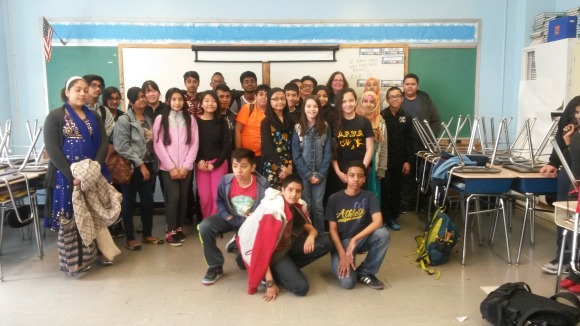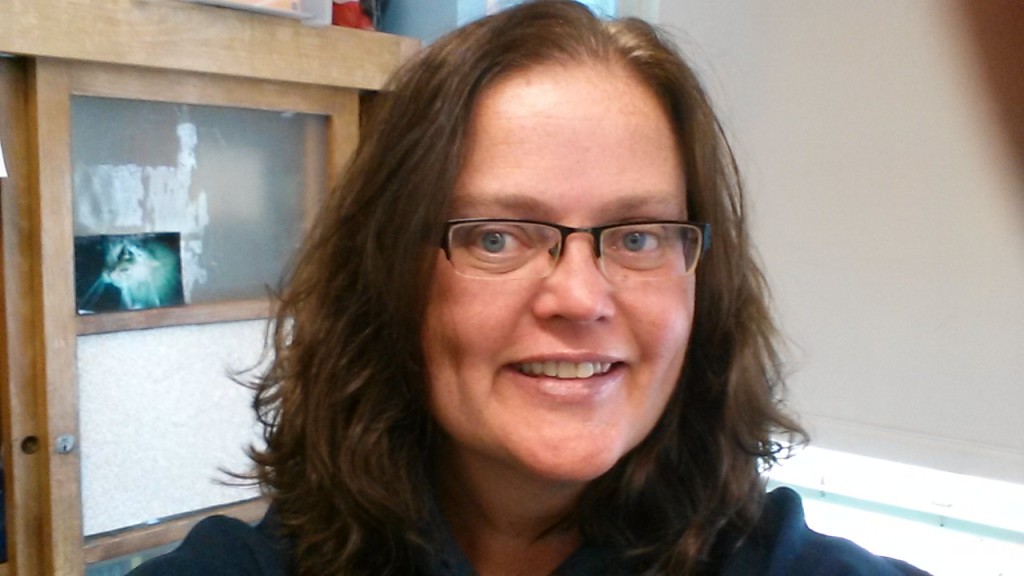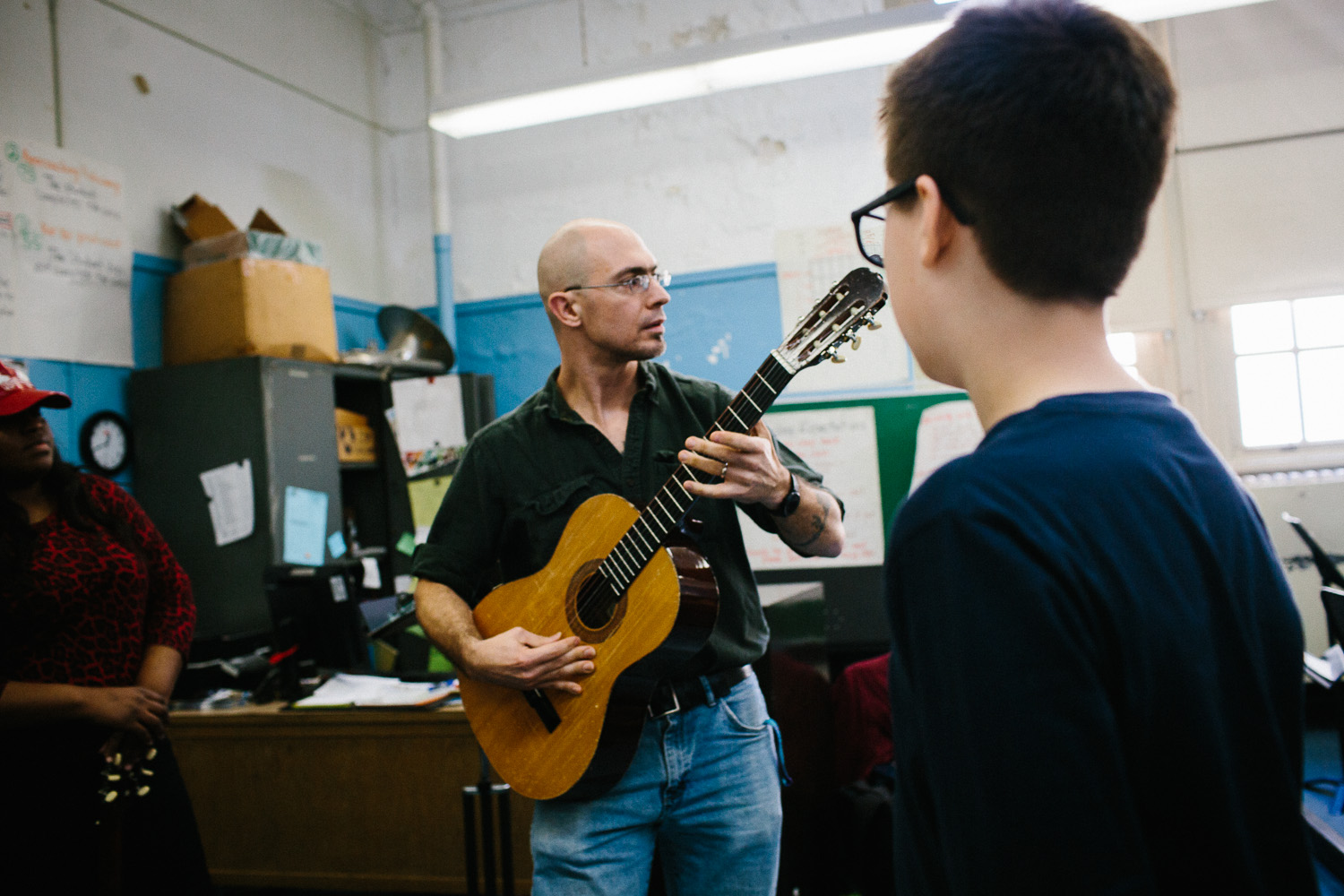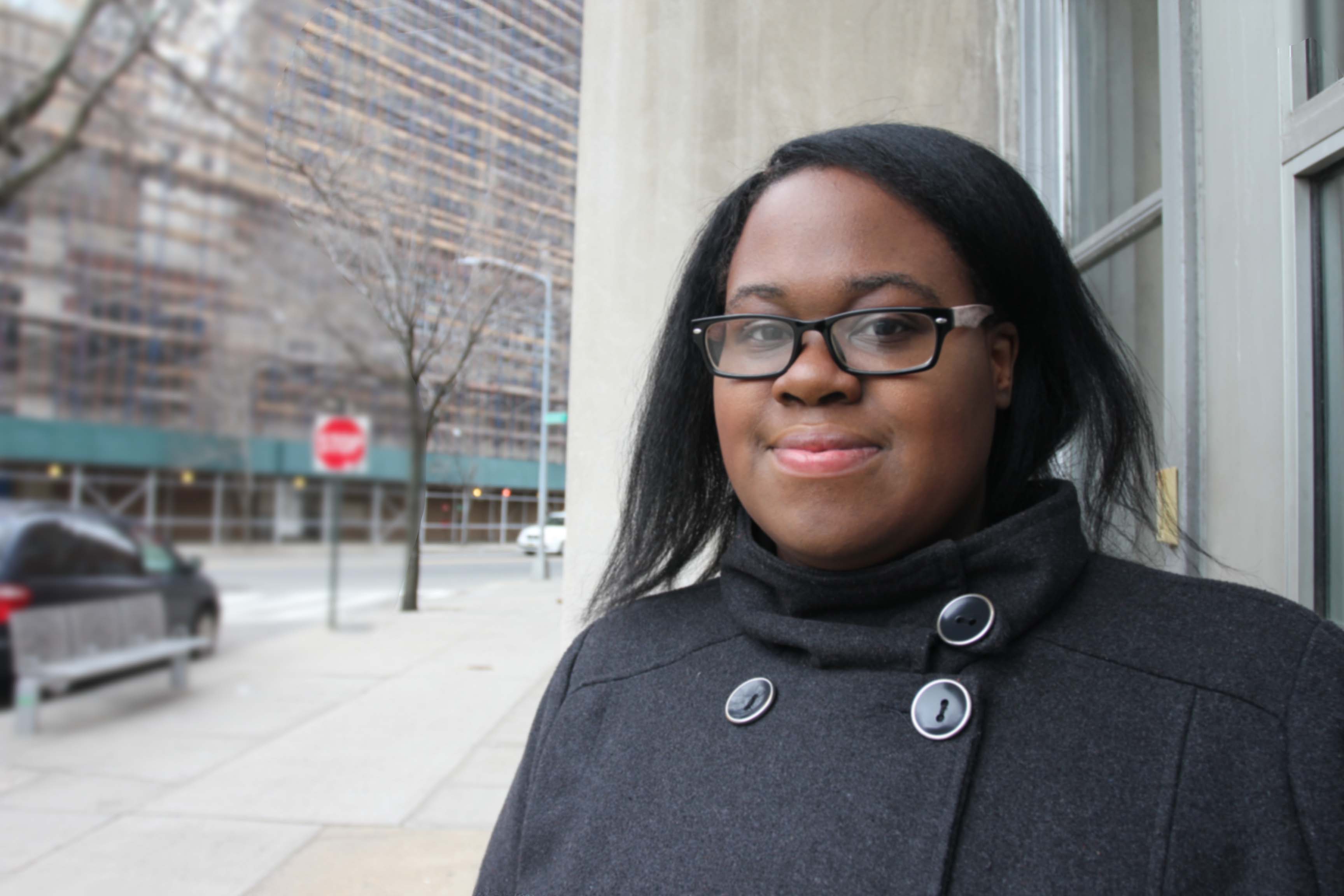
Inside Maryanne Purtill’s seventh-grade classroom at I.S. 62 in Brooklyn, N.Y., students were listening to her read passages aloud from a book in anticipation of an author’s visit the following week, in early February. She said there weren’t enough books for everyone but she wanted to give students a sense of the story.
So, she paced around the room, book in one hand and read with drama and emphasis from “We Were Liars,” by E. Lockhart.
Every few pages, she’d stop and ask students to quickly ponder a question. Whichever group gave the best answer would a prize that had yet to be named. Purtill danced around the possibilities.
“What could it be?” she said, scanning the room. “Could it be …” she began slowly, with a smirk, “a gently used whiteboard eraser?”
Then, after a slight pause and the students’ eyes on her, she threw her hands in the air with flourish and said “I don’t know!”
Whatever the prize, the students were laughing.

Purtill’s students take well to her no-nonsense demeanor, which is regularly punctuated by a sharp dose of humor. They say it makes the classroom environment fun. “She isn’t like your regular, normal, boring teacher. Like, lecture, lecture, lecture, notes, notes, notes,” said Fareha Huda, 14, a former student of Purtill’s. “She was like lecture, a little joke here and there, O.K., now take a little note.”
That approachability makes her a favorite among students, according to staff at I.S. 62, also known as Ditmas Junior High, a traditional public school in a gentrifying neighborhood in Brooklyn, N.Y.
It would be tempting to believe Purtill had always known teaching was her destiny. But the truth is, she spent more than a decade trying to avoid the classroom. She took a long, unexpected detour into into the more stable, highly paid world of corporate human resources before finding her way back into the classroom.
“I had already done 10 years in corporate America,” said Purtill, who now teaches English for 7th and 8th graders. “And then I found myself back in school in more ways than one.”
The opportunity came in 2001. Chase Manhattan was one year into a volunteer program donating desktop computers to students in Ditmas Junior High. Purtill’s job as a volunteer involved helping coordinate information sessions on the program for parents and installing the computers in students’ homes on the weekends.
At the time, it was rare for middle school children to have their own computers, particularly in a Title I school where there are high rates of poverty. “It was pretty exciting stuff,” said Purtill. “Now all the kids have iPads and tablets but at the time there was a real disconnect.”
Parents were required to attend the information sessions. Buses arrived on the weekends filled with volunteers, carrying computer installation kits, who would make their rounds to students’ homes. “I’d always done some things, like a day of volunteering, but nothing that was so systemic,” Purtill said. She stayed as a volunteer until the program ended years later.
During her time as a volunteer, however, she thought back to when she’d just finished college and was eager to work with children.
At first, she felt nostalgic. Purtill said she’d begun the process of becoming a teacher when she’d graduated college with a degree in English (which she said, jokingly, meant that she was “sort of unemployable”). The bureaucracy at the time was less than appealing to her “young, impetuous” self.
So she entered corporate America instead, first as a receptionist and then as an administrator in human resources for technology and legal companies.
When she found herself once more on school grounds, Purtill realized she had missed her calling. She spent the following summer in 2002 taking credits toward a provisional teaching license. With the economy struggling at the time and jobs scarce, Purtill said she thought she’d teach for a while until the job market picked up again.
She said she wanted to only test the waters as a teacher, telling herself, “‘I’ll do it for two years then go back to the corporate world,’ because that’s what I know.” She wasn’t sure, after all, if she’d would be good at teaching.
More than a decade later, Purtill is glad she did not return.
“I don’t know, it felt like I belonged here,” she said.
Purtill commutes daily from Long Island and often volunteers to chaperone students on field trips.
She also holds tutoring sessions for students to help them apply for specialized high schools. Currently, she’s working with another teacher to help students apply to the Young Scholars Program, which is part of the Jack Kent Cooke Foundation and offers mentoring to students. The after school sessions are currently only an hour and a half long, but she said once there’s more daylight, she will extend the sessions.
“I don’t like the kids going home in the dark,” she said.
It is this personal and engaging relationship with the students that has been evident since Purtill’s early days as a teacher.
Rose Reissman, the director of the Writing Institute at I.S. 62., said she remembers a time when she taught a sixth grade class alongside Purtill. Some students were inherently shy, Reissman said.
In order to liven up the class and engage everyone, Purtill would throw around a ball or talk to a doll as if it were a student in the class, Reissman said. The technique was a little out of the norm, but Reissman said she wholeheartedly embraced it because it suited her teaching style and most importantly, it worked.
“These children are inherently hard workers and are very bright. They push themselves,” Reissman said.
Teachers like Purtill, Reissman said, try to provide the right kind of emotional support to children inside and outside the classroom so that they can develop a level of confidence in their academic capabilities.
Purtill’s instinct to build relationships with students has only grown. She runs the school’s test prep for admission to specialized high school using the same philosophy. The foundation for success, she said, is already there when students have a connection with the teachers.
As a result, the students who succeed in the program, which begins at the end of 7th grade and runs throughout their 8th grade year, are the ones who have taken the program’s teachers during the academic school year. They show up to the test prep after school because they’ve already established trust with the teachers, she said.
In the two years that Purtill has been leading the test prep program after school, 19 students have gotten accepted into the city’s specialized high schools, a jump from only a handful in years prior.
“They work so hard,” she said. “I want to see them get as far you can.”
Her efforts extend beyond the daily school grind, too. She leads after-school programs aimed at preparing students for college-readiness programs and the test for admission to the city’s specialized high schools.
“It comes down to her heart and soul,” said Michelle Esposito, an assistant principal at Ditmas. “She’s an advocate for children.”
Purtill’s colleagues describe her as a tenacious teacher who understands how important the connections are between teachers, parents and students. Esposito said parents want to know that their child is supported and loved in school. Purtill acts at times like a surrogate parent for students by connecting them, their parents and the staff when necessary.
For Huda, it comes down to Purtill simply being approachable. She “looped” with Purtill, taking her for 7th and 8th grade and regularly comes back as an after-school volunteer.
“She’s like a friend-ish,” Huda said. “First, she’s a teacher and then she’s, like, friend-ish afterwards. It’s really easy to tell her anything and she’s really supportive.”



